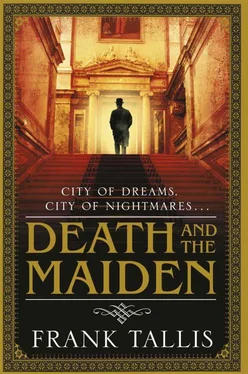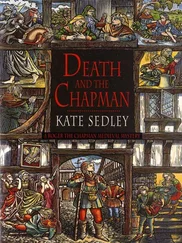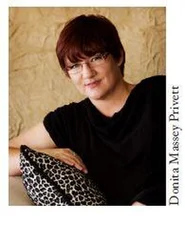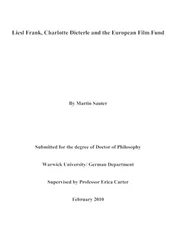Frank Tallis - Death And The Maiden
Здесь есть возможность читать онлайн «Frank Tallis - Death And The Maiden» весь текст электронной книги совершенно бесплатно (целиком полную версию без сокращений). В некоторых случаях можно слушать аудио, скачать через торрент в формате fb2 и присутствует краткое содержание. Жанр: Исторический детектив, на английском языке. Описание произведения, (предисловие) а так же отзывы посетителей доступны на портале библиотеки ЛибКат.
- Название:Death And The Maiden
- Автор:
- Жанр:
- Год:неизвестен
- ISBN:нет данных
- Рейтинг книги:5 / 5. Голосов: 1
-
Избранное:Добавить в избранное
- Отзывы:
-
Ваша оценка:
- 100
- 1
- 2
- 3
- 4
- 5
Death And The Maiden: краткое содержание, описание и аннотация
Предлагаем к чтению аннотацию, описание, краткое содержание или предисловие (зависит от того, что написал сам автор книги «Death And The Maiden»). Если вы не нашли необходимую информацию о книге — напишите в комментариях, мы постараемся отыскать её.
Death And The Maiden — читать онлайн бесплатно полную книгу (весь текст) целиком
Ниже представлен текст книги, разбитый по страницам. Система сохранения места последней прочитанной страницы, позволяет с удобством читать онлайн бесплатно книгу «Death And The Maiden», без необходимости каждый раз заново искать на чём Вы остановились. Поставьте закладку, и сможете в любой момент перейти на страницу, на которой закончили чтение.
Интервал:
Закладка:
Rheinhardt nodded. ‘I asked Professor Mathias if the injury could have been caused by a fall, but he didn’t think so. You see, the rib was completely broken, snapped in two.’
‘And apart from this broken rib?’
‘Nothing.’
‘No other symptoms of pathology?’
‘None at all.’
Rheinhardt waited to see if Liebermann would reach the same conclusion as Professor Mathias. The young doctor lit a second cigar,played a five-finger exercise on his knee, and after a lengthy pause said: ‘Then the cause of death was compressive asphyxia and the rib was broken unintentionally.’
‘Bravo, Max,’ said Rheinhardt, raising his glass.
‘The perpetrator,’ Liebermann continued, ‘discovered Fraulein Rosenkrantz either unconscious or very close to the point of losing consciousness. He or she then applied pressure to her chest to ensure that her lungs would not expand.’
‘And how do you think that was achieved?’
‘Fraulein Rosenkrantz was a small woman. A strong man might simply have pushed down on her chest.’ Leibermann stretched out his fingers to demonstrate. ‘However, compressive asphyxia would probably have been achieved more effectively — and with greater efficiency — if the perpetrator had simply sat on her.’ Liebermann paused, his flow halted by an intrusive image of the opera singer, drugged and laid out on the floor, defenceless. He hoped that she had lost consciousness completely when death finally arrived to take her. ‘Unlike strangulation,’ Liebermann continued, ‘suffocation leaves no tissue damage detectable at autopsy. The perpetrator’s expectation was that attention would focus exclusively on the empty bottles of laudanum and that, eventually, a verdict of accidental death or suicide would be delivered. In the absence of any alternative explanation for Fraulein Rosenkrantz’s death, this would indeed have been the most probable outcome. Most pathologists would reasonably presume that respiratory failure was in some way connected with the laudanum, even if the common signs associated with an overdose were absent.’
The two men stared into the flickering fire. Liebermann found that he could still hear the introductory bars of Death and the Maiden . He was listening to a vivid auditory hallucination and the sombre chords provided a fitting accompaniment to his thoughts. This inner music fell suddenly silent when Rheinhardt asked, ‘Can we deduce anything of the perpetrator’s appearance from Fraulein Rosenkrantz’s injury? His weight and size, for example?’
‘I’m afraid not. The eighth rib is not particularly strong. It would be as likely to break under the weight of a small woman as a large man.’
‘The method itself is of some significance, surely.’
‘One must suppose that the perpetrator had made a thorough survey of the options available to a would-be murderer. Compressive asphyxia would not be the first choice of an uninformed party.’
‘Then the murder might not have been opportunistic, as you at first suggested, but planned.’
‘Indeed, that is also possible. He or she could have forced the singer to drink laudanum at gunpoint, prior to suffocation.’
Liebermann worked his way through the photographs and returned to the initial image, a full-length view of the opera singer lying within the fringed rectangle of a Persian rug.
‘What manner of individual,’ Rheinhardt said, ‘would leave a room in which they had just committed murder, neglecting to address such an obvious cause for suspicion?’
‘Someone in a hurry. Or an obsessive,’ Liebermann replied. ‘Someone whose fastidious character might find expression in the habitual lining-up of objects: a person — most likely male — who favours well-cut clothes and is prone to pedantic speech; an orderly man of above average intelligence who is careful with money and may own a collection of some kind — a numismatist or philatelist.’ Rheinhardt raised an eyebrow at the specificity of his friend’s description. ‘I am simply listing the features of a certain neurotic type ,’ said Liebermann testily. ‘You did invite me to speculate!’
Rheinhardt inclined his head, acknowledging his friend’s rebuke.
‘Quite so,’ he said.
Liebermann extracted a head-and-shoulders portrait of Fraulein Rosenkrantz from the pile of photographs. The camera had exposed a wealth of detail — the curvature of her long eyelashes and the dimples on her cheeks. Her mouth, pouting even in death, suggested a fragile sensuality, the awkward, self-conscious charm of an ingenue.
‘I spent much of today,’ Rheinhardt continued, ‘perusing Fraulein Rosenkrantz’s address book. It contains many names: musicians, bankers, actors, even a Hungarian prince. Some of them might be able to help us with our inquiries. But tomorrow I intend to begin at the opera house. I have an appointment with the director.’
Liebermann sat up in his chair.
‘What? You are seeing Director Mahler tomorrow?’
‘I am indeed.’ Rheinhardt was aware of how much the young doctor venerated the director of the court opera. Such was his devotion to the director’s music that he had travelled to Munich for the premiere of Mahler’s Fourth Symphony. ‘You are welcome to come along with me, if you want, but I had supposed you would be working.’
‘Mahler.’ Liebermann repeated the name with soft reverence. He stubbed out his cigar and asked, ‘What time are you expected?’
‘Eleven o’ clock.’
‘I’ll be there.’
‘But what about your patients?’
‘They …’ Liebermann’s expression became pained. ‘They are just as likely to benefit from a consultation later in the day.’
‘You won’t get into trouble?’
‘No,’ said Liebermann, extending the syllable expansively but failing to sound very convincing.
‘Very well, then,’ said Rheinhardt. ‘Let’s meet at Cafe Schwarzenburg. Ten-thirty.’
7
Franz-Josef — Emperor ofAustria, Apostolic King of Hungary, King of Jerusalem, King of Bohemia, King of Dalmatia, King of Transylvania, King of Croatia and Slovenia, King of Galicia and Illyria, Grand Duke of Tuscany and Cracow, Margrave of Moravia, Duke of Salzburg, Duke of Bukovina, Duke of Modena, Parma and Piacenza and Guastalla, Princely Count of Habsburg and Tyrol, Prince of Trient and Brixen, Count of Hohenembs, Grand Voyvoce of Serbia and Duke of Auschwitz — woke from a nightmare. It had taken the form of a hellish vision: mobs in the street, gunfire, and improvised incendiary weapons spilling fire across the cobblestones outside the palace. Field Marshal Radetzky, in reality dead for over half a century, had burst into the chancellery wing. All is lost , he had cried. It is over. Undone . These lamentations had been appropriated from a play that the emperor had attended at the court theatre only the previous evening. In the strange permissive world of dreams there was nothing contradictory about Radetzky quoting a line from a tragedy written decades after his own death. Similarly, the emperor had not troubled to question why a large orchestra had been playing a Strauss waltz while Vienna burned.
The awful vision had left him with a sense of foreboding, a portentous dread that sent shivers of unease down his spine.
It was still dark.
After reaching out for some matches, the emperor lit a candle. The clock face showed that it was three-thirty. Franz-Josef doubted that he would be able to get to sleep again. And anyway, there was little to be gained by trying because he rose every morning, without fail, at four, and was never at his desk later than five. It was a custom that he broke with only under exceptional circumstances, and nightmares could no longer be classified as exceptional.
Читать дальшеИнтервал:
Закладка:
Похожие книги на «Death And The Maiden»
Представляем Вашему вниманию похожие книги на «Death And The Maiden» списком для выбора. Мы отобрали схожую по названию и смыслу литературу в надежде предоставить читателям больше вариантов отыскать новые, интересные, ещё непрочитанные произведения.
Обсуждение, отзывы о книге «Death And The Maiden» и просто собственные мнения читателей. Оставьте ваши комментарии, напишите, что Вы думаете о произведении, его смысле или главных героях. Укажите что конкретно понравилось, а что нет, и почему Вы так считаете.












